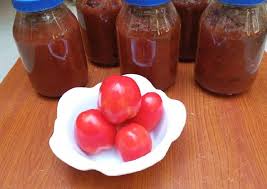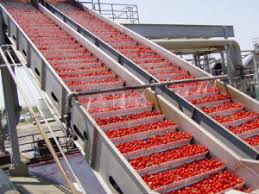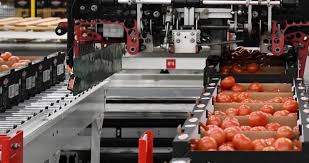![]()
If you’ve landed on this article page, you’re probably searching for a
good business idea—an idea that’s light on the pocket but heavy on
returns, promising both a fulfilling journey and potential profit.
|
How To Start A Lucrative Tomato Paste Production Business in
Nigeria
Tomato paste is a concentrated form of tomato puree, commonly
used as a flavoring agent in various food products. It is made
by cooking ripe tomatoes for several hours to evaporate the
water content, and then straining and packaging the remaining
thick, red paste.
Research has shown that Nigeria has a significant advantage in
tomato production due to its favorable climate and large arable
land. The peak harvest season for tomato in Nigeria is between
March and May, with a second season between September and
November. On average, a hectare of land in Nigeria can yield
about 40-50 tonnes of fresh tomatoes, which can produce
approximately 6-8 tonnes of tomato paste.
The maturity period for tomatoes is between 70-90 days after
planting, and the crop can be harvested for up to 5 months. This
presents a significant opportunity for tomato paste production
in Nigeria, as there is a steady supply of fresh tomatoes
throughout the year.
The highest yield of tomato in the history of Nigeria was
recorded in 2010. The overall value of this highest yield was
$687, 610, 000. Still, it couldn`t satisfy Nigerians. The
national demand for fresh tomatoes in Nigeria is about 2-3
million tons every year. Due to the poor production chain,
Nigerians waste from 750 000 to 1, 350, 000 tons of tomatoes.
The life span of processed tomato (paste) is ten times more than
that of the natural tomato and is usually preferred for cooking
quick meals.
For tomato paste, an international network for export will
ensure a continuous demand for the product with higher profit,
but this will require an adequate standard.
A proper advert means such as social media and print media
should be utilized to provide a larger coverage for the demand
of the product.
Sorting and washing: Tomatoes are sorted and washed to remove
dirt and debris.
Blanching: The tomatoes are blanched in hot water to remove the
skin.
Crushing: The tomatoes are crushed to a fine pulp using a mill
or grinder.
Preheating: The pulp is preheated to reduce the moisture content
and improve the quality of the paste.
Concentration: The preheated pulp is concentrated by evaporation
to increase the solids content and thickness.
Filling: The thick paste is then filled into cans or pouches.
Sealing: The filled cans or pouches are then sealed to prevent
contamination.
Pasteurization: The sealed cans or pouches are pasteurized to
kill any bacteria and extend the shelf life of the product.
Cooling: The pasteurized cans or pouches are cooled to room
temperature.
Labeling and packaging: The cooled cans or pouches are labeled
and packaged for distribution and sale.
The packaging of tomato paste is an important factor in its
quality and shelf life. The most common types of packaging used
for tomato paste are cans and pouches. The packaging materials
should be sturdy, airtight, and easy to open. The labeling of
the product should include information such as the date of
production, expiry date, nutritional information, and storage
instructions.
Benefits of The Tomato Paste Production Business In Nigeria and
Africa
Job creation: Tomato Paste Production Business creates
employment opportunities for individuals who work in the
processing plants and those who engage in tomato farming.
Improved food security: Tomato Paste Production Business
contributes to food security by providing a stable supply of
tomato paste, which is a staple ingredient in many African
dishes.
Increased foreign exchange earnings: The export of tomato paste
can earn foreign exchange for Nigeria and other African
countries, improving their balance of trade.
There are different types of Tomato Paste Production Businesses
in Nigeria and Africa, including:
Small-scale Tomato Paste Production Business: This involves
producing tomato paste on a small scale for local consumption or
sale.
Medium-scale Tomato Paste Production Business: This type of
business involves producing tomato paste on a larger scale than
the small-scale business. The production output can be sold
locally or exported to other countries.
Large-scale Tomato Paste Production Business: This involves
producing tomato paste in large quantities for export to other
countries. The production process is automated and requires
substantial capital.
Contract Farming: This involves partnering with farmers to grow
tomatoes for processing into tomato paste. The processed
products can be sold to local or international markets.
Value Addition Business: This involves processing tomatoes into
other tomato-based products such as ketchup, sauce, and juice.
Tomato Farming Business: This type of business focuses on the
cultivation of tomatoes for sale to processors or the fresh
market.
Tomato Processing Machinery Sales and Maintenance Business: This
type of business involves the sale and maintenance of tomato
processing machinery.
Packaging Business: This involves the packaging of tomato paste
into different sizes and shapes for retail or wholesale
distribution.
Tomato Paste Trading Business: This type of business involves
buying and selling tomato paste locally or internationally.
Agro-Logistics Business: This type of business involves the
transportation and storage of tomato paste from the processing
plant to the market.
Research and Development Business: This involves researching and
developing new tomato-based products and improving the
production process.
Consulting Business: This involves providing consulting services
to tomato paste production businesses on production, marketing,
and other areas.
Training and Capacity Building Business: This involves providing
training and capacity building services to tomato paste
production businesses and their staff.
Organic Tomato Paste Production Business: This involves
producing tomato paste from organically grown tomatoes.
Each type of business presents its unique opportunities and
challenges, and entrepreneurs need to choose the most suitable
option based on their expertise, available resources, and target
market.
Concentrated Tomato Paste: This is the most common type of
tomato paste used in the production of tomato paste in Nigeria
and Africa. It is made by removing the seeds and skin from ripe
tomatoes and cooking them down to a thick paste.
Cold Break Tomato Paste: This type of tomato paste is made by
heating the tomatoes to a lower temperature than the hot break
process, which results in a brighter and fresher flavor.
Hot Break Tomato Paste: This type of tomato paste is made by
heating the tomatoes to a high temperature, which breaks down
the fibers and makes it easier to extract the juice.
Organic Tomato Paste: This type of tomato paste is made from
organic tomatoes that are grown without the use of synthetic
pesticides or fertilizers.
Non-Organic Tomato Paste: This type of tomato paste is made from
conventionally grown tomatoes that may have been treated with
synthetic pesticides or fertilizers.
Double Concentrated Tomato Paste: This type of tomato paste is
made by cooking down the tomatoes even further than concentrated
tomato paste, resulting in a more intense flavor.
Triple Concentrated Tomato Paste: This type of tomato paste is
made by cooking down the tomatoes even further than double
concentrated tomato paste, resulting in an even more intense
flavor.
Aseptic Tomato Paste: This type of tomato paste is sterilized
and packaged in aseptic containers, which allows it to have a
longer shelf life without the need for preservatives.
Canned Tomato Paste: This type of tomato paste is packed in cans
and can be stored for a long time without refrigeration.
Bagged Tomato Paste: This type of tomato paste is packed in bags
and is used for industrial purposes.
Each type of tomato paste has its unique properties that make it
suitable for different purposes. Manufacturers in the tomato
paste production business in Nigeria and Africa choose the type
of tomato paste based on their target market and the intended
use of the final product.
With appropriate planning and robust execution, tomato
processing promises to be a sustainable and rewarding business
opportunity. By delivering quality products, Nigerian processors
can play an influential role in developing the nation’s
agro-processing sector.
Get our ebook and video on how to set up a lucrative Tomatoes
paste production Business. You will receive the valuable
resource information with the cost and benefits for setting up a
premium quality Tomato paste factory in Nigeria. It will cover
all the aspects of the project, from analyzing the market,
confirming availability of various necessities such as plant &
machinery, raw materials, manufacturing techniques and
forecasting financial aspects by estimating the cost of raw
material, formulating the income statement, balance sheet and
cash flow.
|







